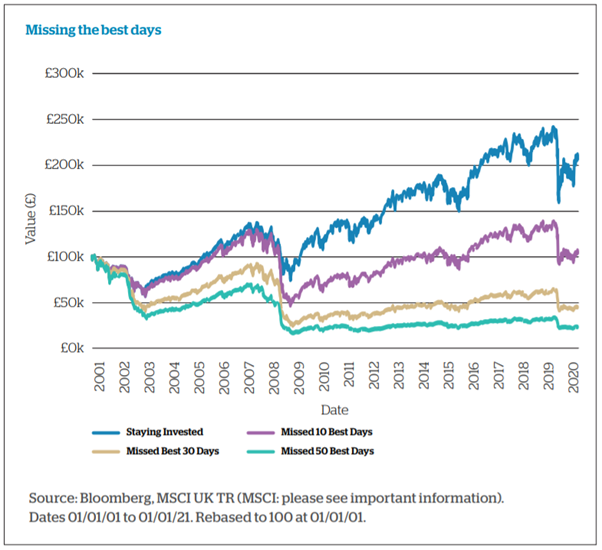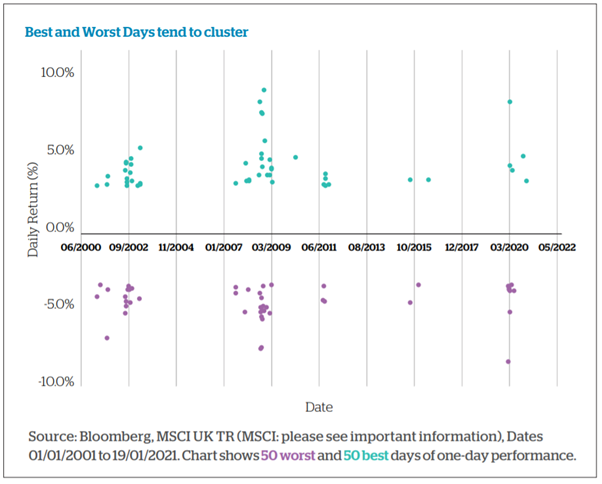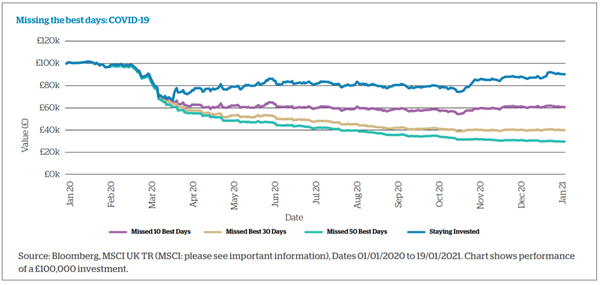By Brooks Macdonald
Over the past two decades, several major global events – including most recently the coronavirus pandemic – have prompted investors to flee financial markets, but data shows this could have been a mistake. When it comes to achieving long-term financial goals, investing – and remaining invested – tends to be the better option.
COVID-19 has had tragic consequences, with the loss of human life at the forefront of people’s minds. The outbreak has seen widespread changes in human behaviour, with lockdowns and social distancing changing the way millions of us now live and work. This has had a dramatic knock-on economic impact with stock markets behaving in an extremely volatile manner at the start of 2020, creating a great deal of worry for investors.
Amidst heightened volatility, it is understandable that many are concerned about the impact on the value of their investments. But, while sharp declines in markets can naturally be disconcerting, if you want to give your investments the best chance of earning a long-term return, then it’s a good idea to practice the art of patience.
When markets fall and fear dominates, it can be difficult to resist the temptation to sell out of the financial markets and switch to cash, with the idea of reinvesting in the future when feeling more positive about market prospects – trying to ‘time the market’. But this is a strategy that carries with it the risk of missing out on some of the best days of market performance. And this could have a devastating impact on long-term returns.
Remaining invested may be an emotional rollercoaster during times of market stress, but research shows time and again that this is the best investment approach over the long term. For example, one study of US equity mutual fund investors showed that their tendency to try and time the market was a key driver of their underperformance (Dalbar, 2019)1.
Despite temptations to switch into cash, data shows that missing out on just the 10 best market performing days can have a big impact on long-term returns. The chart on the next page shows UK equity market performance over 20 years. Staying fully invested during the ups and downs of that period has resulted in an initial £100,000 portfolio having an ending value of £207,000, compared to £104,000 for those that missed the 10 best days.

One of the most common reasons investors lose money is when they try to time the market. People try to avoid the worst days of the stock market by cashing out and then re-investing when they think the market is going to pick up.
However, as the chart below shows, the best and worst days of the stock market are actually much closer than you would think. Try to miss the lows and you’ll probably miss the highs too because the best and worst days tend to cluster together.
 Simulated past performance is not a reliable indicator of future results
Simulated past performance is not a reliable indicator of future results
What has been the experience during COVID-19?
The speed at which the market entered ‘bear’ territory (typically a 20% decline) in response to the coronavirus outbreak, was the fastest in history. However, just 12 months on, markets are hitting all-time highs as they price in a post-COVID-19 environment.
We have also seen the clustering of best and worst days of market performance play out in response to the pandemic. More specifically, the moves in the US equity markets on 24 March 2020 and 12 March 2020 were the best and worst (respectively) since October 2008. This is also true of European and UK equity markets which had daily returns in the top five days on record on 24 March 2020.
Over 2020, missing the best days during the market volatility and subsequent upturn would have had a large impact on the returns generated, when compared with remaining invested throughout.
 Simulated past performance is not a reliable indicator of future results
Simulated past performance is not a reliable indicator of future results
With the benefit of hindsight, we are now fully aware of the global impact of COVID-19, and the rapidity in which it has hit equity markets. While markets rivalled the speed of the virus in trying to price-in the near-term damage, we expected they would also be swift to act when a tipping-point was seen to be close-at-hand. This expectation was played out in the market recovery over 2020 and continues into 2021.
If you try to time the market, there is a significant risk that you will miss the best days of performance. Yes, the journey may not be smooth – as with all investing, values can go down as well as up and neither is guaranteed – but the long-term returns support the case for looking past the short-term news flow and remaining invested, even during volatile times.
Please get in touch with your Brooks Macdonald representative or send us an email at info@brooksmacdonald.com to find out how we can help guide your investment journey. We would be delighted to hear from you!
Important Information
Investors should be aware that the price of investments and the income from them can go down as well as up and that neither is guaranteed. Past performance is not a reliable indicator of future results. Investors may not get back the amount invested. Changes in rates of exchange may have an adverse effect on the value, price or income of an investment. Investors should be aware of the additional risks associated with funds investing in emerging or developing markets.
The information in this document does not constitute advice or a recommendation and you should not make any investment decisions on the basis of it. This document is for the information of the recipient only and should not be reproduced, copied or made available to others.
Brooks Macdonald is a trading name of Brooks Macdonald Group plc used by various companies in the Brooks Macdonald group of companies.
The MSCI information may only be used for your internal use, may not be reproduced or re-disseminated in any form and may not be used as a basis for or a component of any financial instruments or products or indices. None of the MSCI information is intended to constitute investment advice or a recommendation to make (or refrain from making) any kind of investment decision and may not be relied on as such. Historical data and analysis should not be taken as an indication or guarantee of any future performance analysis, forecast or prediction. The MSCI information is provided on an “as is” basis and the user of this information assumes the entire risk of any use made of this information. MSCI, each of its affiliates and each other person involved in or related to compiling, computing or creating any MSCI information (collectively, the “MSCI Parties”) expressly disclaims all warranties (including, without limitation, any warranties of originality, accuracy, completeness, timeliness, non-infringement, merchantability and fitness for a particular purpose) with respect to this information. Without limiting any of the foregoing, in no event shall any MSCI Party have any liability for any direct, indirect, special, incidental, punitive, consequential (including, without limitation, lost profits) or any other damages. (www.msci.com)
Brooks Macdonald Asset Management Limited is regulated by the Financial Conduct Authority. Registered in England No 3417519. Registered office: 21 Lombard Street, London EC3V 9AH.
Brooks Macdonald Asset Management (International) Limited is licensed and regulated by the Guernsey Financial Services Commission. Its Jersey Branch is licensed and regulated by the Jersey Financial Services Commission. Brooks Macdonald Asset Management (International) Limited is an authorised Financial Services Provider, regulated by the South African Financial Sector Conduct Authority. Registered in Guernsey No 47575. Registered office: First Floor, Royal Chambers, St. Julian’s Avenue, St. Peter Port, Guernsey GY1 2HH


